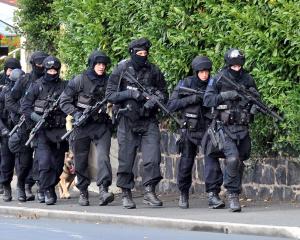More police safety orders are being issued in Dunedin each year to combat domestic violence, harassment and intimidation.
Police safety orders (PSOs) require threatening people to distance themselves from potential victims and their homes and children for up to five days.
They were introduced in July 2010 and help police deal with domestic situations before crimes are committed.
In Dunedin almost 500 PSOs have been issued since the beginning of 2011, including 98 between January and April this year.
Southern police district child protection and family violence co-ordinator Detective Senior Sergeant Steve Gregory said PSOs were a ''real step forward'' as a tool which gave immediate protection to people at risk from violence, harassment or intimidation.
''Those living in intimate partner relationships, be they heterosexual or same-sex couples, have the right to live a life free from violence, fear and the control of a partner.
''PSOs give police the ability to intervene when a crisis occurs and remove the aggressor from the address for up to five days,'' he said.
In 2011, Dunedin police issued 153 PSOs to 128 people, including 26 women.
Seventeen people received more than one PSO during the year.
In 2012, 210 PSOs were issued in Dunedin to 178 people, including 36 women, and 24 people received more than one order.
Det Snr Sgt Gregory said PSOs also protected any children living with the person at risk, and suspended any conditions of parenting orders or agreements for the duration of the order.
''They are especially useful when no actual physical violence has taken place, but police perceive that the likelihood of an escalation to physical violence is a very real possibility,'' he said.
Police did not need the consent of a person at risk to issue an order, which made all the difference in circumstances where the person at risk feared reprisal, Det Snr Sgt Gregory said.
PSOs provided a ''window of opportunity'' for partner agencies to contact those at risk, in order to offer advice and support, he said.
''It also gives people at risk the time to apply to the family court for a protection order, if they wish.''
When introduced, PSOs were expected to result in fewer arrests and court orders for protection or trespass, and therefore less paperwork for police and court staff.
At the time, the then acting national family violence co-ordinator Inspector Brigitte Nimmo said officers often attended incidents where they suspected an offence had been committed, or would be committed, but could not charge a person and take them into custody.
A PSO could be used in those situations, where an officer believed a person was a danger to their family, partner or children, she said.
PSOs gave people at risk ''breathing room'' and time to discuss more permanent solutions with police and staff from other agencies.
''In some situations it could save a person's life. It certainly plugs what has been a frustrating gap for police providing an effective way of intervening in a situation to protect families from violence,'' Insp Nimmo said.
Police safety orders
• Issued when police believe family violence has occurred or may occur.
• Can last up to five days.
• Used to protect people at risk from violence, harassment or intimidation.
• Do not require the consent of people at risk.
• Are not subject to appeal.
• Do not directly result in criminal convictions.
• People under orders must temporarily leave homes and cease contact with people at risk.
• People under orders must temporarily surrender all firearms and firearms licences.
• Children living with people at risk are also protected.
• People can be taken into custody and put before a court for breaching orders.








